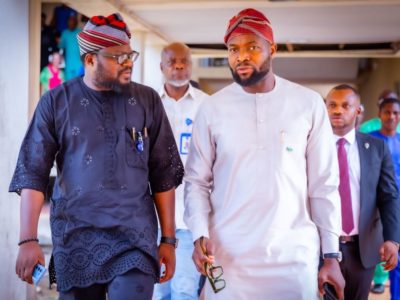By Joy Amaka Onweani
Minister of Communications and Digital Economy, Prof. Isa Ali Ibrahim Pantami, has itemised Nigeria’s 5G goals this week in Lagos at the Stakeholders Engagement Forum on the Draft Information Memorandum on Auction of 3.5Ghz Band.
Pantami stated that Nigeria’s 5G Policy is designed to achieve many goals, “amongst which are:
- to ensure effective deployment of 5G to cover major urban areas by 2025;
- to ensure security of 5G ecosystem and the protection of data;
- to ensure that international best practices and globally accepted standards and specifications are entrenched in Nigeria’s 5G ecosystem; and
- to ensure that the required infrastructure needed for successful deployment of 5G networks such as data centres, power, etc, are catered for in deployment strategies of 5G networks.”
The minister stated that the goals are unachievable without stakeholders input thus the importance of the engagement forum and continuous collaborations.
RELATED Nigeria Chooses January 2022 For 5G Rollout
His words: “You will agree with me that all the above cannot be achieved without proper collaboration amongst the various stakeholders of the industry. The participants at this forum having been carefully selected as the critical stakeholders, along with the Ministry and the NCC. We all have a vital and specific role to play in this journey towards using 5G to support our national economic development agenda.”
5G bringing higher connection speed, mobility and capacity – Danbatta
Also at the forum, Executive Vice Chairman/CEO, Nigerian Communications Commission (NCC), Prof. Umar Garba Danbatta, reiterated the importance of 5G to achieving Nigeria’s goals for digital economy.
His words: “The global impact of 4G technology brought about increase in mobile usage and network performance. 5G technology will leverage on this momentum, bringing substantial network improvements, including higher connection speed, mobility and capacity, as well as low-latency capabilities. In doing so, it enables novel use cases and applications that will positively impact on different sectors of the economy and improve our efforts towards achieving the Digital Economy objectives of the Federal Government as contained in the National Digital Economy Policy and Strategy (NDEPS 2020-2030) and Nigerian National Broadband Plan (NNBP 2020 – 2025).”
ALSO READ NCC To Stimulate Rapid 5G Rollout, Address Insecurity With New Regulatory Instruments
Dantatta said 5G is part of the evolutionary trend of the GSM to improve total experience of subscribers and enhance economies across sectors which underscores why the Nigerian communications market is one of the biggest in Africa and also the largest contributor to the ICT sector of the Nigerian economy.
He said: “Nigeria has an estimated population of 214 million, with an average growth rate of 2.6% annually. Approximately 76.46% of the population is under the age of 35. In line with these demographic changes, internet penetration grew from 3% in 2004 to 73.82% as at September, 2021, and broadband penetration increased from less than 10% in 2015 to 40.01% in September, 2021”.
“Arising from the significant growth of broadband penetration in Nigeria, which stands at 40.01% as at September 2021, it has become imperative for us to evolve to the next phase of global development of the sector, given the opportunities that are abound for all stakeholders in the industry and the economy at large.
“5G technology does not only offer enhanced broadband and ultra-reliable low latency communications, it also provides massive machine type communications, where lots of devices will seamlessly connect and interact independently with the Internet without human intervention. Thus, enabling our Smart City Initiatives and making Broadband Use Cases a reality.”
The NCC’s boss added: “Given the importance of 5G technology and the critical role of Spectrum, the International Telecommunications Union Radio Communication Sector (ITU-R) conducted studies in its last two study cycles during the World Radio Communication Conferences of 2015 and 2019 (WRC-15 & WRC-19) and identified Spectrum for 5G technology including the 3.5GHz band, which stands out due to its excellent propagation characteristics which offer both capacity and coverage.”


































